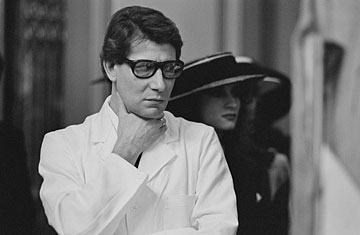
French fashion designer Yves Saint Laurent celebrates the twentieth year of his career in 1982 in Paris
Yves Saint Laurent, considered the greatest French couturier of his generation, died in Paris on Sunday. He was 71. Saint Laurent, who retired from fashion in 2002 because, he said, it had been "reduced to mere window-dressing," was widely considered the father of democratized fashion and the designer most often associated with the feminist ideal of empowerment in the 1970s.
He was one of the first European designers to create ready-to-wear in the mid-1960s and famously brought street fashion to haute couture, showing such basic clothes as peacoats, biker jackets and beatnik-inspired looks on his high fashion runway. In 1966 he introduced his famous Le Smoking and became the first designer to dress women in silhouettes traditionally reserved for men. Paloma Picasso, a longtime friend and client, once said: "He put trousers into a woman's wardrobe and made our lives easier." Saint Laurent always claimed he not only wanted to make women look beautiful, but also to give them confidence.
Born in Oran, Algeria, Saint Laurent left home at 17 to work for Christian Dior in Paris. Upon Dior's death in 1957, Saint Laurent took over the fabled French couture house and, at only 21, garnered worldwide attention for his revolutionary first collection of short swingy trapeze dresses. The day after his Dior debut, French newspaper headlines claimed that Saint Laurent had "saved France."
After suffering a nervous breakdown during his mandatory military service, Saint Laurent was let go from Dior in 1962 and founded his namesake house with the help of his business partner Pierre Berge. The couturier took inspiration from diverse sources including exotic fantasies (the Ballets Russes), the cultural zeitgeist (Mondrian), and pedestrian clothing (safari jackets). He was arguably the most widely copied designer of his generation.
Saint Laurent suffered dramatic health problems, often retreating to his home in Marrakesh for months to recuperate from nervous and physical exhaustion. At the celebration of his 40th anniversary in fashion, Saint Laurent told TIME magazine "I am amazed, even quite astounded, that I could have lasted so long in fashion, and that people still love me."
Saint Laurent's style — and perhaps the reason for his enduring influence on fashion — was best summed up by Berge when he said "the most important thing for Saint Laurent is not to follow or precede, but to always be of his time. Not in the past, not in the future, just at the right place."
